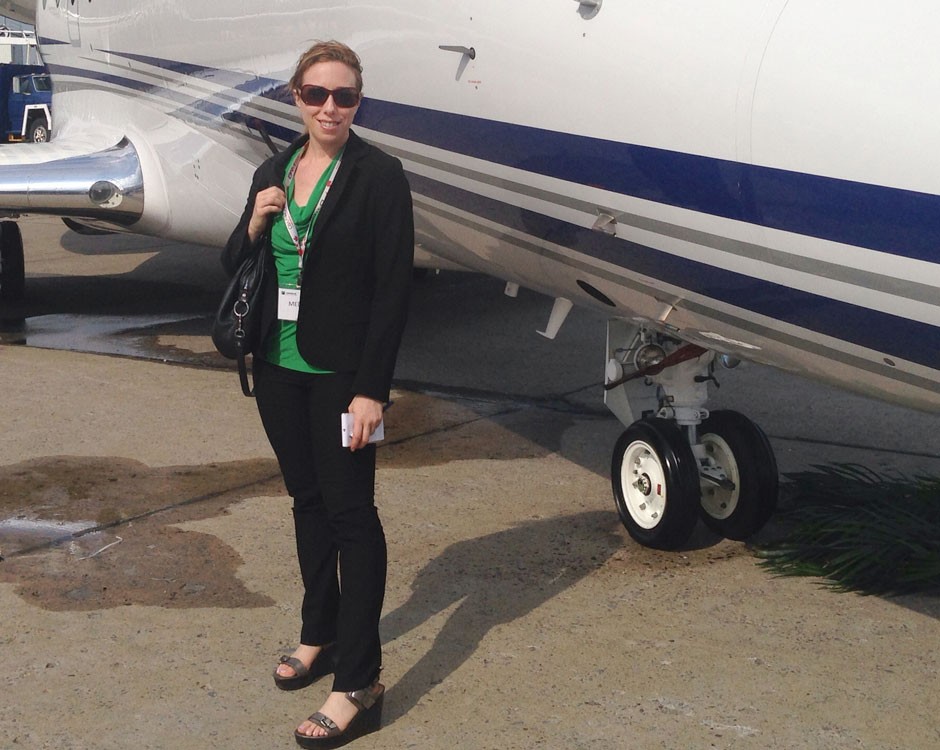A reporter’s journey
Journalist Allison Lampert, BA (broadcast journ.) 98, will never forget January 1, 1999 — the day she covered her first big story as a staff reporter for the Montreal Gazette.
 Journalist Allison Lampert was part of the Reuters’s team that took home a Best in Business Canada award in April for beat reporting.
Journalist Allison Lampert was part of the Reuters’s team that took home a Best in Business Canada award in April for beat reporting.
“There was an avalanche in Nunavik on New Year’s Day, killing nine and injuring 25 people,” recalls Lampert, who is now the Montreal correspondent for Reuters. “Not only was it my first big story — the tragedy was picked up by CNN and AP — but also the first time I’d covered Inuit issues.
“I felt overwhelmed as a young reporter mixed in with a pack of veterans. But when I arrived in the remote town of Kangiqsualujjuaq, population 700, I was moved by the humanity of the Inuit residents, most of whom welcomed us into their homes and shared their stories.
“One man cradled his infant daughter and struggled to hold back tears. Talking to victims and people who’ve lost family and friends is an incredibly difficult thing.”
Although this trial-by-fire assignment was early in her career, Lampert was not exactly a novice. She had been freelancing for the Gazette since her first year studying broadcast journalism at Concordia.
“By my third year, I was doing five classes a week, plus working ‘night police’ at The Gazette in my last semester, from 6 p.m. to 1 a.m. on weekends,” recalls Lampert, who still made time to write for the student newspaper, The Link. “Night police is the gig nobody wants, but for me it was very exciting.”
Lampert credits her mentor in the Department of Journalism, author and professor Sheila Arnopoulos, MA 78, for encouraging her to publish articles as soon as possible.
“Sheila really stressed the importance of working in the real world, writing real stories,” says Lampert, who was born and raised in Manhattan and Long Island, N.Y., before moving to Montreal to live with her grandmother at the age of 16.
“What I learned in the field is never to assume you know what a person or story is about until you do the research,” she says. “People lie, exaggerate and spin. Even after all these years in the business, I am still regularly surprised.”
Onward, to Reuters
After an accomplished career at The Gazette on the retail, business and real estate beats, as well as uncovering municipal corruption in Laval and spending time embedded with the Canadian military in Kandahar, she took a buy-out in 2014.
Then she landed a prestigious job at Reuters last April as their Montreal correspondent, handling the transportation portfolio, among others. She’d freelanced for Reuters previously, and enjoyed working with a team of international colleagues.
One year later, she’s still thrilled with the position. It’s unpredictable, which is part of the allure. “But I had to transition from thinking very locally to globally — for example, my first story for Reuters was the downing of Malaysia Airlines Flight 17,” says Lampert.
“MH17 was an important global story because it underlined the simmering violence between Russia and Ukraine while illustrating one of every commercial passenger’s worst nightmares,” says Lampert.
“I remember waiting outside the International Civil Aviation Organization (ICAO) building in Montreal. Within a week, I had my first Reuters exclusive — a scoop on how ICAO would hold an international meeting as the industry’s most coordinated response to the downing of the MH17.”
What advice does this intrepid correspondent have for other budding journalists?
“Be pushy. Journalism is really competitive, both in terms of getting a job and in getting the stories that matter,” she says. “The best stories you’ll ever report are the ones you’ve had to struggle to nail down.”
